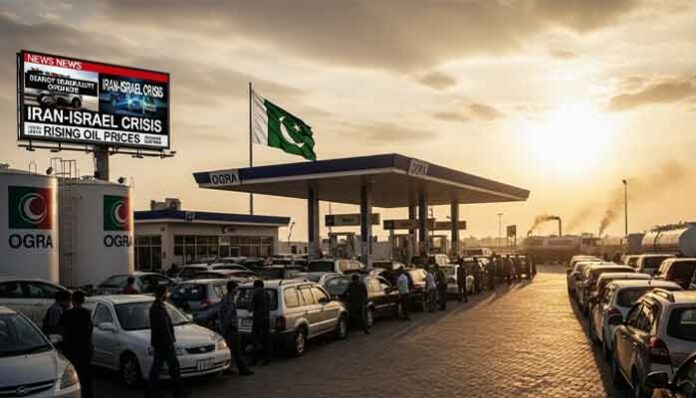Fuel Safety Steps During the Iran-Israel Crisis
The fuel authority has asked for 140 million litres of petrol to be brought in from abroad right away to avoid a shortage. This urgent import request is a direct response to the Iran-Israel crisis.
Due to growing problems between Iran and Israel, Ogra has asked fuel companies to store enough petrol and diesel to cover at least 20 days, just to be safe. Precautionary storage is being emphasized due to the Iran-Israel crisis.
Speaking on Saturday, a representative from Ogra shared that the oil authority has told fuel companies they must stick to the rules about keeping enough fuel stored. They’ve also asked for 140 million litres of petrol to be brought into the country right away. This step is seen as vital to ensure stability amid the Iran-Israel crisis.
According to the spokesperson, oil companies have been told they must store enough fuel to last 20 days, as promised when they got their licenses. The compliance check is particularly crucial during the Iran-Israel crisis.
Right now, the country has enough petrol and diesel for daily use, a government official confirmed. To avoid any supply issues, Ogra is keeping a close check on the fuel situation. This step is being taken to make sure people continue to get fuel without any trouble. Authorities are acting cautiously because of the Iran-Israel crisis.
Fuel Supply Problems Because of Iran-Israel Crisis
To make sure fuel reaches the country sooner, the authorities have changed their plans, an oil ship that was meant to come on July 6 will now arrive earlier than planned.
Officials shared that the vessel, loaded with around 70 million litres of petrol, is now likely to reach the country on June 26. Accelerating shipments is part of the response to the Iran-Israel crisis.
Pakistan State Oil (PSO) has said that by July 1, the country will receive an extra supply of 140 million litres of petrol.
Officials added that new emergency fuel deals might be arranged later, depending on how the situation in nearby countries develops.
PNSC officials have raised concern that if the key ocean route is disturbed or shut down, it could cause serious problems for Pakistan, as most of its oil comes from Gulf countries.
Regional unrest has made oil shipping more costly, according to industry insiders. The fee for one oil tanker trip, which was around $900,000 before, has now climbed to between $1.1 and $1.2 million. Insurance costs have also gone up sharply, now reaching $22,000 per trip instead of the earlier $15,000. Experts believe prices may continue to rise if tensions don’t ease.
Staff at PNSC have shared that ships are running into some trouble while passing through the Strait of Hormuz. One of the main problems is that GPS signals go missing for short periods at certain times.
One of the ships from PNSC had to stay outside the strait for about two hours because the GPS stopped working, as shared by the sources.
The government has decided not to reduce the Petroleum Development Levy for now. Authorities also warned that fuel prices in the country could rise, as international oil rates have gone up by 16% because of the Iran-Israel crisis.
During Monday’s National Assembly finance meeting, chaired by Naveed Qamar, Finance Secretary Imdadullah Bosal gave an update on the fuel situation. He said Pakistan currently has enough petrol saved, but if international oil prices keep going up, the country might need to raise its fuel prices too. Officials are watching the situation closely to decide the best course of action.
He mentioned they are paying close attention. If the price of oil goes up around the world, we will have to raise our prices as well, and the extra charges will not be removed.
Omar Ayub, the opposition leader, said Pakistan’s financial troubles are deepening. He pointed out that the country is caught in a big debt problem, and the current conflict could make both the government’s budget and trade balance worse.
For once, Finance Minister Muhammad Aurangzeb saw eye to eye with the opposition. He announced that Prime Minister Shehbaz Sharif has created a top-level team to track the costs and reserves of petrol. This committee was formed as a precaution during the Iran-Israel crisis.
Tensions in the Middle East have taken a serious turn. The recent sharp rise in conflict between Israel and Iran has pushed the region into a dangerous new stage of war. People are watching closely as the situation unfolds.
Reports from Iran’s state news say that at least 430 people have died and around 3,500 have been injured because of the Israeli attacks. These casualties reflect the severe human toll of the Iran-Israel crisis.
For authentic news and the latest updates, stay connected with: DumdaarPoint.com

